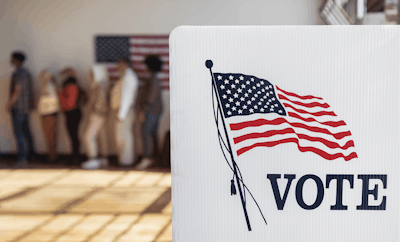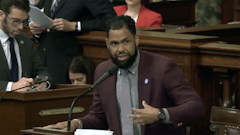
ON THE BALLOT
NEW JERSEY: ADULT USE A legislative effort to legalize adult-use cannabis stalled in the New Jersey Senate in spring 2019, prompting lawmakers to place the legalization question on the state’s 2020 ballot.
The initiative is a constitutional amendment that would broadly legalize adult-use cannabis in the state, as well as authorize a taxed and regulated system for distribution.
“It allows certain taxations for sales tax and a local tax, but doesn’t give a lot of detail on how the regulatory process works,” Bill Caruso, an attorney with Archer & Greiner and a member of both New Jersey United for Marijuana Reform and NJ CAN 2020, told Cannabis Business Times in a May interview.
NJ CAN 2020, a campaign coalition supporting the state’s adult-use legalization ballot initiative, has two main priorities: ensure the ballot measure is successful, and then work with industry stakeholders and the New Jersey Legislature to implement an adult-use marketplace with social equity at the forefront.
NJ CAN 2020 will advocate for a robust automatic expungement process (for those who qualify) in the state’s forthcoming adult-use cannabis program, among other provisions. The campaign would also like to see language included in the state’s adult-use cannabis law that allows ex-offenders to participate in the legal industry.
“All of these issues that we’ve been fighting for [will help] shape this industry in a positive way from a racial and social justice standpoint,” Caruso said.
MONTANA: ADULT USE In mid-July, the hard work of New Approach Montana campaigners paid off: County-level data showed that a sufficient number of the organization’s more than 130,000 signatures had been verified in order to place two adult-use cannabis legalization measures before voters in November.
That was no small task. In the midst of the coronavirus pandemic, social distancing guidelines made it difficult to gather the required signatures across an already sparsely populated state. In late April, a court ruling prevented the campaign from moving to an electronic signature drive—further dampening prospects.
But New Approach Montana prevailed. “We overcame the odds by running the most innovative signature drive ever seen in Montana,” campaign officials wrote on Facebook in July. “Now, we are focused on building support with voters from across the state.”
On the table are two complementary ballot initiatives. Statutory Initiative 190 would establish a system to regulate and tax cannabis for adult use, while Constitutional Initiative 118 would authorize Montana to set the legal age for consumption at 21. As campaign officials have stated, the two issues are meant to pass together.
Looking ahead, Dave Lewis, retired Montana state legislator and budget director for three Montana governors, said in a public statement that these issues could really galvanize a state budget that’s been hammered by economic shutdowns this year.
“COVID has done a number to the state’s projected tax revenue for 2020 and 2021. It’s been devastating,” Lewis said. “Adding nearly $50 million dollars a year to the state budget with legal adult-use marijuana isn’t just a bonus. This projected revenue has already become vital to the future budget of this state, and veterans’ services, like all other services, need tax revenues to continue.”
MISSISSIPPI: MEDICAL Mississippians for Compassionate Care, the group behind Medical Marijuana 2020, has succeeded in putting a medical cannabis measure, Initiative 65, in front of Mississippi voters this November. State legislators also have introduced a competing measure, Alternative 65A, to appear on the ballot. Voters can choose between those two options or choose not to legalize medical cannabis in the state.
Medical Marijuana 2020 gathered 105,686 certified signatures, more than the required 86,185, for its initiative to appear on the ballot. The group gathered signatures from Mississippi’s formerly five congressional districts (there are now four), as is required by state law, and qualified for the ballot in January, said the campaign’s communication director, Jamie Grantham, in a July interview with CBT. If passed, Grantham says Initiative 65 will provide “a robust program” to be regulated by the Mississippi Department of Health.
The state legislature passed House Concurrent Resolution 39 to put Alternative 65A on the ballot. (The state representatives behind Alternative 65A could not be reached for comment.) It contrasts with Initiative 65 in several ways. For instance, it limits smoking cannabis to only terminally ill patients. It also doesn’t specify possession limits, qualifying conditions, taxes, which agency will oversee the program, nor a deadline for said agency to issue medical cannabis cards.
SOUTH DAKOTA: BOTH South Dakotans have a chance to do something no other state has accomplished: legalize both medical and adult-use cannabis on the same ballot.
New Approach South Dakota, the group behind the state’s medical cannabis measure, and South Dakotans for Better Marijuana Laws, the organization that brought the adult-use constitutional amendment, have joined forces after both of their ballot initiatives qualified for the November 3 election.
“We just saw no reason to do them separately,” says Drey Samuelson, political director for South Dakotans for Better Marijuana Laws. “There’s a lot of efficiencies in doing them both at the same time.” In fact, the way Amendment A (the adult-use constitutional amendment) is worded, its passage guarantees the enactment of Measure 26 (the medical cannabis ballot measure).
Among other items, Measure 26 would: cap licensing fees for medical cannabis establishments at $5,000 (adjusted annually for inflation); implement a sliding scale for patient application and renewal fees based on household income; and require the state’s Department of Health (DoH) to issue rules within 120 days of the effective date of the act.
Amendment 2 gives South Dakota’s Department of Health until April 1, 2022, to enact rules and regulations around the licensing and oversight of the state’s cannabis industry. It also proposes a 15% excise tax on cannabis sales to consumers.
Neither bill proposes a cap on licenses nor do they put forth a mandated minimum number of licenses, instead leaving that up to the discretion of the DoH.
SIGNATURE VALIDATION STILL NEEDED
ARIZONA: ADULT USE After submitting more than 420,000 signatures July 1 to qualify an adult-use cannabis legalization measure for Arizona’s 2020 ballot, Smart and Safe Arizona’s campaign organizer, Stacy Pearson, is confident that the initiative will appear before voters this fall.
The group needed to collect 237,645 valid signatures by July 2 to place its statutory measure on this year’s ballot, and despite setbacks stemming from the ongoing COVID-19 pandemic, Smart and Safe not only met, but dramatically exceeded, its goal.
“Everything’s tracking, so we’re confident that we’ll be on the ballot and we’ll win in November,” Pearson told CBT in a July interview, adding that the campaign should know by mid-August whether its initiative is officially certified for this year’s ballot.
NEBRASKA: MEDICAL Nebraskans For Medical Marijuana hope to find out by mid-August if enough of the more than 182,000 signatures the group submitted July 2 are valid to qualify for a ballot initiative this November. Roughly 121,000 signatures are required to put the constitutional amendment legalizing medical cannabis in front of Nebraska voters, according to the campaign.
“There is definitely a possibility there will be some challenges to some of our signatures from the opposition who doesn’t want this to appear in the ballot,” Jared Moffat, who has worked on the campaign for more than a year through his role with the Marijuana Policy Project (MPP), told CBT in a July interview. “... We’re feeling good, but we’re not quite at the place of feeling great about being on the ballot just yet.”
Assuming the initiative qualifies for the ballot and voters approve the constitutional amendment, the next challenge will be to determine what a medical cannabis program looks like in Nebraska. The constitutional amendment only establishes the right for patients to access medical cannabis from their doctors and authorizes the legislature to establish regulations governing the sale, production and distribution of medical cannabis. The details will be worked out later, Moffat said.
OKLAHOMA AND IDAHO HOPE FOR MIRACLES
OKLAHOMA: ADULT USE Oklahoma, still riding the wave of a medical cannabis business boom ushered in by a 2018 vote, is looking less certain on the adult-use front.
State Question 807 was drafted to legalize adult-use cannabis in the state, but the ongoing coronavirus pandemic has thrown a massive obstacle at campaign organizers. Gov. Kevin Stitt’s March 15 emergency declaration included a stay on signature-gathering efforts. Then, a legal challenge brought by a competing reform campaign dragged the SQ 807 team into court.
Only in late June, when the legal challenge was dismissed, did a judge give the SQ 807 campaign a chance to go out and collect signatures. What’s needed now is just shy of a miracle: 178,958 certified signatures by Aug. 24.
IDAHO: MEDICAL Coming up short on the signatures it needed due to the coronavirus pandemic, the Idaho Cannabis Coalition initially suspended its pursuit to place the Idaho Medical Marijuana Act on the November 2020 ballot.
But the initiative received a fresh breath of life when a federal judge ruled in June that the state must allow another unrelated campaign in the state, Reclaim Idaho, to either collect signatures online or automatically place their issue on the ballot, reports the Idaho Press. The state has since permitted Reclaim Idaho to collect signatures electronically.
The Idaho Cannabis Coalition had hoped the ruling would apply to its campaign as well, but after sending two letters to the secretary of state asking for guidance on how to proceed, the answer is still unclear. “The coalition is now in the process of assessing its options and whether there is a path forward,” Tamar Todd, the legal director for New Approach PAC (which is assisting the campaign), tells CBT.
The medical marijuana campaign in Idaho has already gathered about 40,000 voter signatures of the 55,057 required to quality for the ballot, reports MPP.
“I am hopeful that there is a path forward given the initiative was well on its way to qualifying and would have but for COVID-19,” Todd says. “The coalition is entitled to the same accommodations as the other campaign and will continue to explore that option.”
STATES PIVOT TO 2022
ARKANSAS Two groups that had hoped to place adult-use cannabis legalization initiatives on Arkansas’ 2020 ballot have refocused their efforts on the 2022 election after falling short of the required number of signatures needed to qualify.
Arkansans for Cannabis Reform had been relying on mail-in petitions to gather the nearly 90,000 signatures required by a July 3 deadline to get its proposed constitutional amendment before voters this fall. A judge ruled in May that ballot initiative campaigns could collect signatures remotely, but the state’s attorney general filed an appeal, and an appeals court then placed a stay on the original ruling until the case is heard.
Arkansas True Grass faced similar hurdles in qualifying its proposed constitutional amendment for the 2020 ballot and has started gathering signatures to qualify the measure for the 2022 election instead.
MISSOURI Missourians for a New Approach’s 2020 ballot initiative to pass adult-use cannabis legalization in the state ended because of the coronavirus pandemic that has swept the nation. Now, the group is looking ahead to the 2022 ballot.
Dan Viets, an attorney who chairs the group’s advisory board, says the task of gathering signatures from 8% of voters in six out of Missouri’s eight congressional districts, as governed by state law, required numerous resources but was feasible until the pandemic struck.
NORTH DAKOTA Advocates looking for cannabis reform in North Dakota had best train their eyes on 2022. The campaign to land a “compromise” measure on the 2020 ballot was overwhelmed by the challenges posed in the midst of the coronavirus pandemic. Legalize ND cut its campaign in April.
The setback follows a failed ballot measure in 2018 that would have legalized a fairly liberal setup for cannabis in North Dakota. That year, Legalize ND picked up 41% of the vote. The group came back with plans to scale down the reach of its legalization measure and make the issue more palatable to a mostly conservative electorate.
“There are political realities,” Legalize ND campaign chairman David Owen said after ending the 2020 efforts. “… What we found was that nearly a two-thirds majority of North Dakotans are opposed to home grow, just lock, stock and barrel. I get it, we all want the best possible bill, but at a certain point, the key word there is possible, and possible doesn’t mean I can write it down. Possible means I can sell it.”
Read the Cultivation Startup & Expansion Guide























